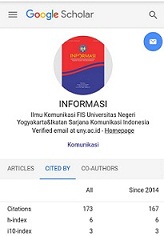KPK: KORBAN BALAS DENDAM POLRI (Analisa Naratif Model Greimas Pada Karakter KPK dan Polri di Majalah Tempo)
DOI:
https://doi.org/10.21831/informasi.v48i1.15090Keywords:
jurnalistik, media, laporan investigasiAbstract
The reporting of KPK and Polri in is interesting when viewed as a series of films or fictional stories. This research tries to dissect how the narrative model Algirdas Greimas can be used to read the relation of characters that appear in a story like fiction. Using the main report of three Tempo editions selected among the Nine Tempo editions containing KPK and Polri reporting in 2015. Three of nine editions were selected in the middle as the culmination of the story of the entire series of KPK-Polri reporting stories. Using the actan model of Algirdas Greimas, it was found that the parties involved in the KPK-Polri story consisted of many people who, if assembled in actor model relationships, would find a knot that the conclusion of this study was that the KPK was narrated as a weak party, full of problems, and violate ethics so it must be handled and resolved by the Polri. In these three stories, Polri, represented by Bareskrim, is narrated as an institution that protects and controls the violation of the Law. The KPK is then represented as the wrong party for violating the rules, while the POLRI is the right party because it enforces the rules.
Pemberitaan KPK dan Polri di majalah Tempo menjadi menarik ketika dilihat sebagai sebuah rangkaian kisah film ataupun kisah fiksi. Maka penelitian ini berusaha untuk membedah bagaimana model narasi Algirdas Greimas dapat digunakan untuk membaca relasi karakter yang muncul dalam sebuah pemberitaan layaknya kisah fiksi. Penelitian ini menggunakan laporan utama tiga edisi Tempo yang dipilih diantara Sembilan edisi Tempo yang memuat pemberitaan KPK Polri pada tahun 2015. Tiga dari sembilan edisi, dipilih tiga edisi di bagian tengah sebagai puncak kisah dari seluruh rangkaian kisah pemberitaan KPK-Polri. Menggunakan model actan dari Algirdas Greimas, didapatkan data bahwa pihak yang terlibat dalam kisah KPK-Polri terdiri dari banyak orang yang saling berelasi. Kesimpulan dari penelitian ini, KPK dinarasikan sebagai pihak lemah, penuh dengan masalah, dan melanggar etika dan hokum sehingga harus ditangani dan diselesaikan oleh Bareskrim Polri. Dalam ketiga kisah ini, POLRI yang diwakili Bareskrim dinarasikan sebagai lembaga yang mengayomi dan melakukan penertiban terhadap pelanggaran Undang-Undang. KPK kemudian direpresentasikan sebagai pihak yang salah karena melanggar aturan, sedangkan POLRI adalah pihak yang benar karena menegakkan aturan.
References
Eriyanto. (2013). Analisis Naratif: Dasar-dasar dan Penerapannya dalam Analisis Teks Berita Media. Jakarta: Kencana.
Birowo, M. Antonius (Editor). (2004). Metode Penelitian Komunikasi. Yogyakarta: Gitanyali.
Elliot, Jane. (2005). Using Narrative in Social Research. London UK.
Eriyanto. (2013). Analisis Naratif (Dasar-dasar Penerapannya Dalam Analisis Teks Berita). Jakarta: Kencana Prenada.
Harsono, Andreas. (2010). Agama Saya Adalah Jurnalisme. Yogyakarta: Penerbit Kanisius.
Santana, Septiawan. (2004). Jurnalisme Investigasi. Jakarta: Yayasan Obor Indonesia.
Jurnal:
Hardy, Melissa. Bryman, Alan. (2004). Handbook of Data Analysis: The Uses of Narrative in Social Science Research. SAGE Research Methods Online.
Majalah Tempo Edisi 2-8 Februari 2015
Majalah Tempo Edisi 9-15 Februari 2015
Majalah Tempo Edisi 16-22 Februari 2015
Forum diskusi KPK Polri http://forum.detik.com/kpk-watch-t889191.html, diakses 27/11/16).
Zainal Arifin Mochtar, Pengajar Ilmu Hukum, Ketua PUKAT FH UGM (dalam http://pukatkorupsi.ugm.ac.id/?p=3882, diakses 27/11/16) Tentang UU KPK
Muhtarom, 2015 berjudul "˜Ini Bunyi Perpu Pengangkatan Plt Pemimpin KPK https://m.tempo.co
Downloads
Published
How to Cite
Issue
Section
Citation Check
License
Authors who publish with this journal agree to the following terms:
- Authors retain copyright and grant the journal right of first publication with the work simultaneously licensed under a Creative Commons Attribution License that allows others to share the work with an acknowledgement of the work's authorship and initial publication in this journal.
- Authors are able to enter into separate, additional contractual arrangements for the non-exclusive distribution of the journal's published version of the work (e.g., post it to an institutional repository or publish it in a book), with an acknowledgement of its initial publication in this journal.
- Authors are permitted and encouraged to post their work online (e.g., in institutional repositories or on their website) prior to and during the submission process, as it can lead to productive exchanges, as well as earlier and greater citation of published work (See The Effect of Open Access).












